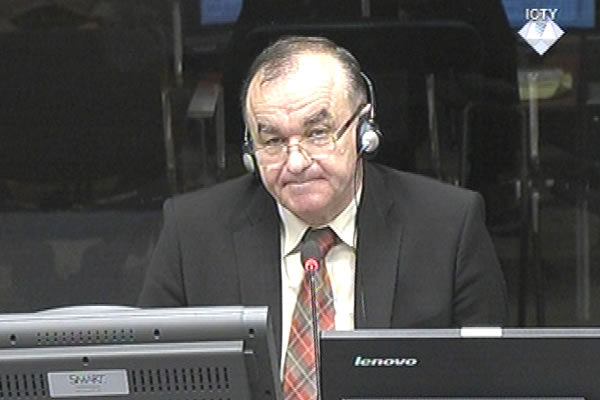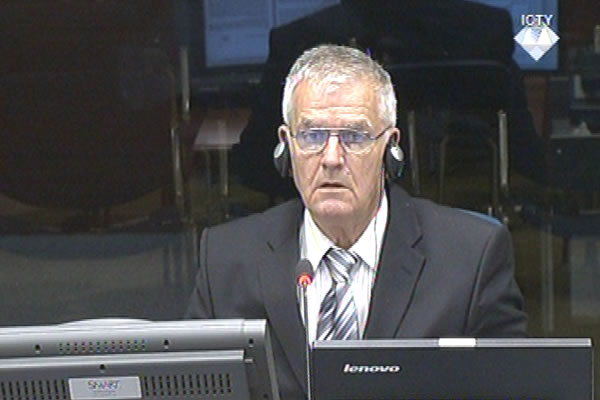Home
BLAMING THE ‘OTHER SIDE’
Former employee of the State Security Service, first of BH and later of Republika Srpska, blames Croats and Muslims, their paramilitary formations and criminals for starting the war and for the crimes against civilians. In fact, the witness blames everyone but the accused Ratko Mladic and his armed forces
 Tomislav Puhalac, defence witness at Rako Mladic trial
Tomislav Puhalac, defence witness at Rako Mladic trial Before the war Tomislav Puhalac worked in the BH State Security Service. In 1992, Puhalac switched to the same job, in the newly established Republika Srpska State Security Service. In his statement to Mladic’s defense, Puhalac mostly focused on the events that had led to the conflict. In Puhalac’s view, Croats and Muslims were to blame for the war. As he explained, Croat and Muslim politicians did everything to ‘discriminate against’ Serb representatives in the government and to stop them from participating in the decision making process.
The Muslim-Croat coalition called up the police reserve force and turned them into paramilitary formations, the witness claimed. As Puhalac noted, at that time ‘notorious criminals were issued MUP credentials’. Those persons harassed Serbs, for example, by stopping them at check points. The witness was stopped at a check point, his service pistol was seized. The men at the checkpoint threatened they would kill him. Soon afterwards, the witness was sacked and forced to leave Sarajevo. According to the witness, his flat was burgled and looted as were the apartments of other Serb police officers. Serbs who didn’t leave the city were imprisoned and killed, Puhalac claimed.
In the cross-examination, prosecutor MacGregor noted that the witness left Sarajevo on 4 April 1992. The allegations in his statement about the events in the city after that date were not based on his personal knowledge but on hearsay, the prosecutor stressed. The witness agreed in part, saying that as an employee of the secret service he received reports about the developments in Sarajevo throughout the war from Serbs who were leaving the city and from intercepted enemy communications.
The prosecutor asked him if he heard from his sources that in the spring of 1992, the Bosnian Serb army had placed Sarajevo under siege. Puhalac told him that the BH Army was the first to encircle as it tightened its positions. The Serb side then responded by doing the same thing. As a consequence, during the war Sarajevo was encircled by both sides, the witness explained.
In the second part of today’s hearing, Trifko Komad began his evidence. Komad is a former member of both the main and executive boards of the Serbian Democratic Party. At the beginning of 1993, Komad moved to the Republika Srpska Government Office in Belgrade. Komad’s statement from the trial of Radovan Karadzic was admitted into evidence. At Karadzic’s trial, Komad described the functioning of the Bosnian Serb government. Komad’s statement to Mladic’s defense was also admitted into evidence. In this statement, Komad described his wartime encounters with the accused. Today in court the witness described it in more detail.
Komad met Mladic for the first time in Pale in May 1992 at a meeting between the Serb military and political officials. The efforts to organize the defense of the Serbs in BH was discussed at the meeting. The witness and the accused met the second time in July 1993: Komad and a group of Orthodox priests from the US brought humanitarian aid for the army to the VRS Main Staff. When they met the third time, it was only in passing, after work in Belgrade. Komad could not remember when exactly that encounter took place. The witness didn’t offer any detailed observations from those encounters.
Prosecutor Bibles used Komad’s appearance in court to confirm her argument that there was a strict hierarchy in the Bosnian Serb government. The orders from the top were implemented at a local level through the chain of command. The witness didn’t oppose the claim, but refused to confirm it. Sometimes, the groups and individuals at municipal level acted ‘contrary to the principles’, he said. According to Komad, the multiparty system was in its infancy. Those days were marked by ‘meandering’ and unrealistic aspirations of some politicians. Trifko Komad will complete his evidence tomorrow.
Photos
Linked Reports
- Case : Mladic
- 2014-11-06 HOW MILITARY COURT PROSECUTED SERBS IN BIJELJINA
- 2014-11-05 WITNESS KNOWS NOTHING ABOUT CRIMES OF HIS FELLOW FIGHTERS
- 2014-11-04 SERBS SECEDED FROM BH BECAUSE THEY WERE ‘HUMILIATED AND OUTVOTED’
- 2014-11-11 ‘SERB’ OR ‘INDEPENDENT’ AUTONOMOUS REGIONS?
- 2014-11-12 NO MUSLIMS IN ROGATICA BY THE END OF WAR
- 2014-11-13 ‘IGNORANT TYPIST’ MADE A MISTAKE

